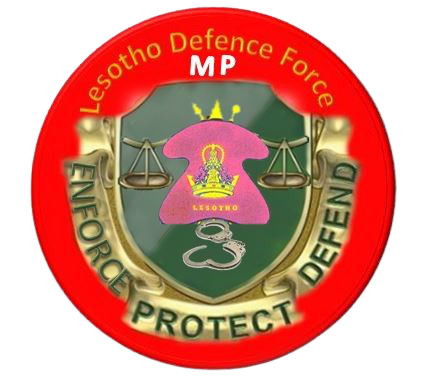The establishment of the Lesotho Defence Force Military Police (LDF MP) follows the appointment of the Provost Marshal that derives from the Lesotho Defence Force ACT 1996; section 16 (1) (a) and (b) respectively, which states that "there shall be a Provost Marshal who shall be appointed by the Commander of the Defence Force from among the officers of the Defence Force. It further states that the officer shall be responsible for the enforcement of discipline within the Defence Force and shall further carry out other duties as may be assigned to him by the Commander of the Defence Force. The LDF MP unit initially known as Provost Unit is amongst the first that were formed during the process of the establishment of the Police Mobile Unit (PMU) in 1966.
The unit comprised of two officers who wore a black brassard cloth; a piece of cloth worn around the upper left arm as part of uniform that identifies the unit and was marked "P", hence the name "Li Pi" (police men) by Lesotho soldiers. With the growth of the army, the numbers rose to the company strength due to high demand and the broadening scope of the unit, including a change of name to that of MP and attire; wearing of a red brassard marked MP, red berets and red belt. At its initial stage it was aimed at assisting the then PMU in the enforcement of high discipline and good order, maintenance of high morale and prevention of any acts that may jeopardize the image of the organization. With developing nature of the army, the roles of the MP broadened to answer the demands of its stakeholders; focusing and maintaining Civil Military Relations aspect from different angles.
MISSION
To assist the Lesotho Defence force (LDF) in the preservation of high morale, good order and discipline. To prevent breaches of rules and orders by soldiers and officers.VISION
To be a reputable, detective and responsive unit of excellence in performance.
Services
The services provided by the MP include the enforcement of high discipline and good order, maintenance of high morale and prevention of any acts that may jeopardize the image of LDF, assisting Civil Police in the investigations of offences involving LDF Personnel, solving disputes and conflicts between the military members and the public. It is also responsible for controlling movement of personnel and vehicles in and out of the LDF Barracks, including the provision of pilots and escorts for VIPs among other duties.
TRAINING AND DEVOLOPMENT
Being a Military Police personnel does not exempt one from being a soldier who can engage the enemy in case they are caught in the middle of war. The MP members first attend a basic and formal military training like all members of the regular force and are taught military tactics, field craft and use of weapons. Following selection into MP unit, the lessons cover police duties, investigations, handling evidence, and military law including other areas of policing.
The training is continuous and is determined by the Provost Marshal when he realizes any requirement. He directs the area to be covered basing himself on the challenges on the real time situations.
Discipline
Discipline is the corner stone any military setting and a willing instant obedience to orders. The Duke of Wellington once stated that a perfect state of discipline existed where subordinates fulfilled the wishes of their superiors just as well in their absence as in their presence. The MP members demonstrate a highly disciplined behavior in order to be able to control service members as they sometimes confront unwelcome behaviours from members and have to take them to task.
Courtesy
MP members sometimes are forced to deal with their seniors where they surpassed the rules. Despite being at the helm of discipline, and regulations they, still have to show respect by having courteous communication. That is, members still need to be polite, bearing in mind the rank they are dealing with, despite the wrong doing in question.






